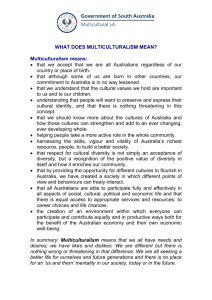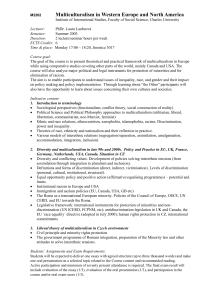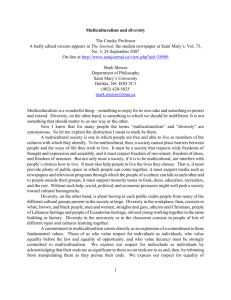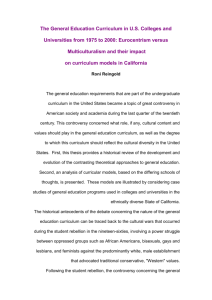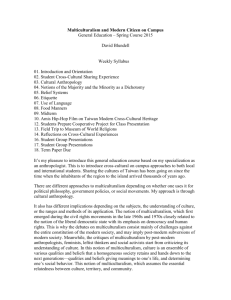Multiculturalism and cultural diversity in modern nation-state
advertisement
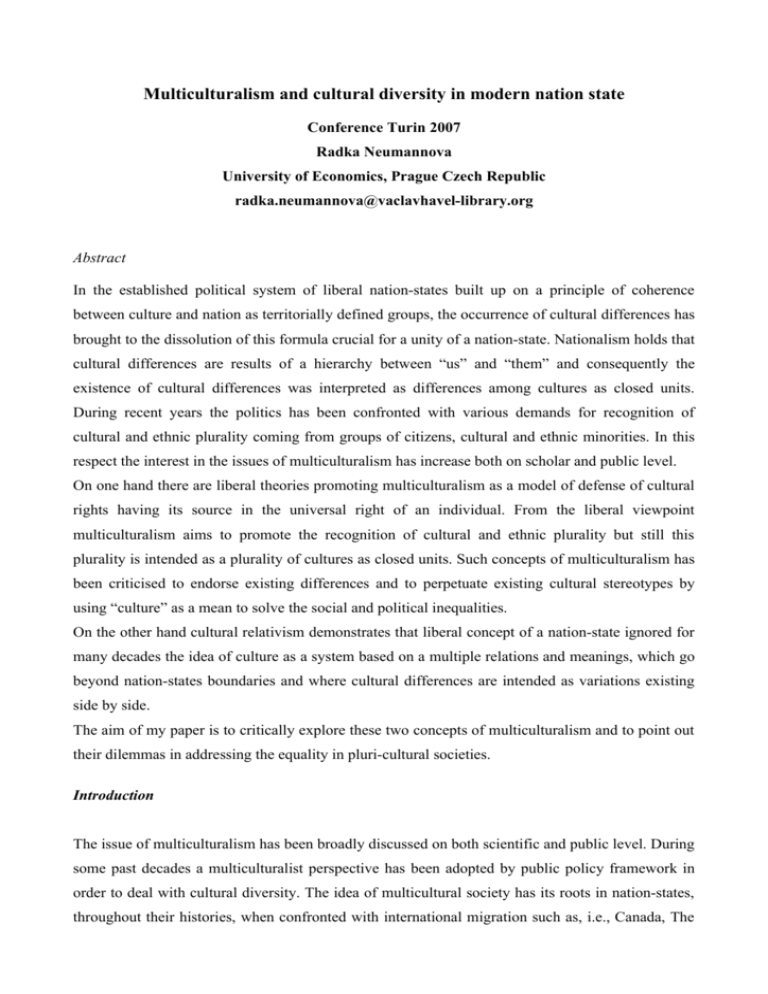
Multiculturalism and cultural diversity in modern nation state Conference Turin 2007 Radka Neumannova University of Economics, Prague Czech Republic radka.neumannova@vaclavhavel-library.org Abstract In the established political system of liberal nation-states built up on a principle of coherence between culture and nation as territorially defined groups, the occurrence of cultural differences has brought to the dissolution of this formula crucial for a unity of a nation-state. Nationalism holds that cultural differences are results of a hierarchy between “us” and “them” and consequently the existence of cultural differences was interpreted as differences among cultures as closed units. During recent years the politics has been confronted with various demands for recognition of cultural and ethnic plurality coming from groups of citizens, cultural and ethnic minorities. In this respect the interest in the issues of multiculturalism has increase both on scholar and public level. On one hand there are liberal theories promoting multiculturalism as a model of defense of cultural rights having its source in the universal right of an individual. From the liberal viewpoint multiculturalism aims to promote the recognition of cultural and ethnic plurality but still this plurality is intended as a plurality of cultures as closed units. Such concepts of multiculturalism has been criticised to endorse existing differences and to perpetuate existing cultural stereotypes by using “culture” as a mean to solve the social and political inequalities. On the other hand cultural relativism demonstrates that liberal concept of a nation-state ignored for many decades the idea of culture as a system based on a multiple relations and meanings, which go beyond nation-states boundaries and where cultural differences are intended as variations existing side by side. The aim of my paper is to critically explore these two concepts of multiculturalism and to point out their dilemmas in addressing the equality in pluri-cultural societies. Introduction The issue of multiculturalism has been broadly discussed on both scientific and public level. During some past decades a multiculturalist perspective has been adopted by public policy framework in order to deal with cultural diversity. The idea of multicultural society has its roots in nation-states, throughout their histories, when confronted with international migration such as, i.e., Canada, The United States and Australia. These states are conventionally referred to as examples of various forms of multicultural society, accommodated through nation states public policies. Still, the issue of multiculturalism includes a variety of different problems, which take new shapes according to the different political circumstances where they manifest themselves. Western European countries lately recognized the need to react to the cultural diversity brought in by immigrants as a consequence of their immigration and integration policies. This issue was brought up, for instance, by ethnic clashes in Yugoslavia and East Europe after the fall of communism, and by the crisis of the traditional nation-state in Western Europe, determined by non-European immigration into this area. Due to these and other events, multiculturalism has been seen as the root of possible intranational ethnic conflicts and discords. Most of the scientist and researchers identified the problem of multiculturalism as a challenge to liberal democratic system and to civil society. The cultural aspects of international migration has been studied in the light of several thematic issues, starting from religious, ethnic and linguistic diversity, in order to describe case studies and specific issues on a local level. As we can observe, lot of research has been done in the field, but there are still problems of integration, and continuous cultural misunderstandings and integration policies are not quite innovative. This cultural turn in social research redressed the period when culture, in its variety of elements, did not gain the researchers attention in processes such as state formation and political legitimation. Let us now turn to the multicultural problem in its own specificity. 1. Multicultural recognition and the question of plural society To what extent can a pluralistic society include immigrants, who do not accept society’s principles, without disintegrating itself? On the other side, how can states integrate immigrants, who have completely different ethnic origin, cultural principles and religion? These are two crucial questions, which Giovanni Sartori asks in the preface of its book Pluralismo, multiculturalismo e estranei. Saggio sulla societá multietnica ( (Sartori, 2005:10). In more recent times the issue of multicultural society in political philosophy has been very closely related to the question of liberal society and liberal nation-states. Liberal society, according to its definition, is there to guarantee individuals’ universal rights for freedom and autonomy. Modern nation states have so far been inclined towards promoting unifying and inclusive policies, and their aim still is to promote equality among citizens in regard to their civil rights in social and political life. In practice, these political demands have usually manifested themselves into assimilation policies meant to safeguard integration of diverse cultural groups. Recognition of an individual on a national level, acknowledged through a set of given cultural and linguistic stereotypes and political symbols, has been considered as an essential step towards the acquisition of a citizenship in a nation state. Promised equality among citizens presented by modern liberal and welfare states also influences the content of strategies that minority groups assume towards a state’s political institutions (resistance as a result of exclusion or assimilation). Achieving equality in accessing civil rights often meant for individuals from different cultural groups to gain the status of full citizens, and thus join the spiral of national identification. Cultural nationalists hold that a democratic society could solve the problem of integration only via shared national culture, thus making out of a nation an indispensable entity and reconcile nationalism with normative political activity. Increasing cultural diversity, which we can observe in modern nation state since the beginning of the nineties of the last century, has focused our attention to the promotion of rights for different cultural groups. However, it appears that the recognition of the rights for cultural groups would lead to a denial of liberal rights for the individual, hence the new neo-liberal theories attempt to reconcile the autonomous and universal right of liberalism with those of different cultural groups residing in one state. The right for the culture and the so called right for the recognition (where individuals are recognized as members of groups through which their rights are applied) appears to constitute the basis for neo-liberal forms of pluralism and multiculturalism. Following these ideas, it seems that multiculturalism deliberates over two interconnected issues in contemporary society: cultural diversity and politics of recognition. Cultural diversity is often taken for granted by the multiculturalist, in order to give an answer to ethnic conflicts or clashes. On the other hand, political movements fighting for recognition of their cultural identities are justified in the optics of multiculturalism and should be taken into consideration. The basic premises of multiculturalism, promoted by Will Kymlicka, are that membership in a cultural community is essential to our personal identity and provides individuals with the necessary framework to exercise their true liberty (Kymlicka 1995:82-93). In Kymlicka’s theory cultural recognition and identity are values belonging to all human beings, and they are also a premise for our individual autonomy. The attempts of multiculturalism to guarantee individuals’ rights, mainly consisting in the possibility to change their own cultural identity, lead us to conclude that these rights are embodied in internal principles holding for any community (for example see Tamir 1993: 25-32, Raz 1994:162). Also Charles Taylor’s politics of recognition has its roots in communitarian liberalism (Taylor 1992). Its central notion, the recognition of cultural rights of groups, should be guaranteed equally to each group, because all cultures have an equal value. The concept of ‘recognition’, firstly used in the philosophy of German Idealism to reflect upon the inter-subjective formation of individual identities, through confrontation and interaction with other(s), (Honneth 1996) have now become the key concept for the consideration on what appeared to be a series of socio-cultural movements and struggles (Benhabib 2002:50). Such politics of recognition is not interested in affirmative action, reducing the inequalities and redefining equal opportunities for all; its goal is rather the formation of ‘differentiated citizens’, and of a state with sensibility for a difference. The main issue of policies designed under the influence of the politics of recognition is that they lead to divisions among citizens. In both cases, either affirmative action or politics of recognition lead to a reaction, where discriminated groups claim the same advantages given to other groups, while those groups with strong cultural identity claim for more privileges at the expenses of non supported cultural groups. Such backlashes keep alive a discriminative behavior of disadvantaged groups or groups which are not accepted, or which are denied by a community. Michel Walzer would ascribe these two actions to different types of liberalism. One type of liberalism is mostly concerned with liberal rights of individuals, in this way wishing to create a neutral state. A second kind of liberalism, which permits one or more nations to flourish on the account of other nations, while the rights of citizens, who are engaged in civil life, are, preserved (Walzer 1994:99). As Baumann shows, multiculturalism cannot ask individuals whether they perceive themselves to be identified enough with their culture, in order to be recognized as politically or socially equal (Baumann 2003:144). The question of the moral relevance for the cultural rights observed in multicultural theories of Will Kymlicka or Charles Taylor, in order to justify other political or social actions, makes out of cultural recognition a matter of universal human rights and, consequently, the possible goal of political struggle for reaching equal representation. Nonetheless, the politics of recognition by defending the recognition of cultural rights of groups as a matter of fact creates spaces for producing and sharpening differences and their establishment in a community’s social and political dimensions. Therefore, the multicultural theory proposed by Kymlicka and the neoliberal multiculturalist researchers has been criticized, as it would not propose any solution towards a conciliation of cultural/ethnic differences with political institutions, but it would rather create distance and increase the political relevance of these differences. Following this logic, multiculturalism would not bring to the unity of different cultural groups in one state, but rather to social dissolution and further differentiation. Such sort of multiculturalism turns into a non-tolerant policy, denying the mutual recognition and integration, and it leads to the so called”balkanization” of societies. The cultural diversities of various groups are therefore radicalized into political programs, and society is politically and socially increasingly polarized. The idea that economic development would help liberate individuals from their fixed roles and identities could explain why modern liberal theory, has been inclined to ignore the question of cultural diversity. Still, nowadays neo-liberal economists express a certain degree of confidence when promoting the theses according to which markets are gradually going to weaken particular forms of identity. Such a view bears some resemblance to past modernization theories; dominant liberal tradition downplayed the relevance of cultural diversity, in order to treat this issue as an irrelevant element, without any effect on the normative condition of social justice. Nonetheless, the new arguments of neoliberal multicultural theories promote the tolerance and integration models for cultural differences, in order to re-establish the state neutrality. As Raz puts it “to do one’s best to help or hinder the parts in an equal degree” (Raz 1986:153). A plural society should therefore be promoted, but it is not specified how to build its social unity, when dealing with different identities. The general presuppositions are that the principle of citizenship will guarantee the equality among citizens, both in civil rights and duties. Such principle of citizenship expects the state to show neutrality towards cultural and ethnic differences. Under the influence of the latest developments, especially during the nineties of the 20th century, related to more and more visible cultural diversification and development from national to multinational, the above mentioned premises were adjusted in order to fit the new scenario. The thesis of an equal citizenship has adjusted to the new character of nation states, by recognizing new national minorities and cultural groups. However, the main obstacle for the proposed models of integration is that it is necessary to will it, in order for it to exist. As Rusconi puts it: “To be a citizen does not mean to use social goods in the form of subjective rights, but also to take a responsibility to cooperate to their formation” (Rusconi 1996: 21 my own translation from Italian). The danger in integration of citizens who do not see this responsibility towards a state and towards other citizens implies that we can create differentiated citizenship based on a refusal of a state, which does not recognize cultural or ethnic differences. Such an idea of a differentiated citizenship was proposed during the nineties in the liberal multicultural theories by Will Kymlicka (Kymlicka 1995) and Iris Young (Young 1990). Citizenship is then presented less as a system for attributing rights and more as a political field, meant to redefine the symbolic boundary markers for national identity (Brubaker 1992). As a consequence, different symbolic labels that a nation attributes to immigrants directly influence the distribution of material sources towards them and their potential for mobilization and participation. We can so conclude that migration and immigration do not mainly lead to cultural or ethnic miscellany, which was assumed in the theory of “melting pot”, but they rather result in cultural solidity of different groups. Such processes do not refer much to multiculturalism intended as pluralism of cultures, but to multiculturalism of difference instead, which presents cultural peculiarities of different groups rooted in a perception of cultures as closed and clearly delimited units, as Baumann notices (Baumann 2003:128). However, we can ask a question as to whether all the political and social movements really aim for socio-cultural recognition. These observations have led me to the point of asking whether we really need a political strategy to manage cultural diversity, when culture is capable in its autonomy to accommodate differences without restrictions. A second remark, pointed out by many researchers during the last ten years, is whether the demand for recognition of cultural differences is really connected to existing cultural diversity, or whether it only represents the will of cultural groups for adjusting social and political inequalities. As John Rex reflects “The politics of multiculturalism can induce a process of “minorization” coming from culturally different members of society; immigrants use their cultural differences as a marker in order to deal with social and political inequities” (Rex 1996:5). The interdependence of politics of recognition and redistribution in contemporary politics cannot be only the result of the assimilation policies of nation states towards minorities, but also of the fact that cultural differences did not have their real political relevance. People cannot live apart from their culture and any culture cannot be constituted apart of differences. Those who live within a specific cultural system usually are not aware of their cultural difference or do not perceive them as a problem, in order to use them as politically claimed values or rights (Vermeulen and Slijper 2002). Some researchers though emphasize the fact that, if an individual or a group want to demand their own culture as a right, they first have to detach themselves from their culture. The capacity for culture is not inherent to individuals as such, but it originates from collective social life as, so to speak, concomitancy of social character typical of human interactions. This means that there are no limits to different kinds of social groups or relations that could generate their own cultural identity. It does not matter which character these groups have either naturally or consciously formed. Therefore different small societies can reform themselves as “cultures” in order to be politically competitive in the contemporary world. Turner demonstrates this process in cases of identity politics of subcultural groupings in first-world societies (Turner 1991). He concludes his anthropological critique to multiculturalism in claiming that “A significant point of this critique do not regard only the false acquaintance of theory of culture, but furthermore intentions of multiculturalism. Under the influence of current historical and theoretical context, multiculturalism became a program not just for equalisation of relations among existing cultural groups and identities, but as well for liberation and encouragement of the processes of creating new ones “ (Turner 1993:427). The complex analysis of cultural groups’ political claims for social and economic benefits, and for the recognition of their specificity has been developed by Seyla Benhabib in her book The claims of culture. Equality and diversity in a global era (Benhabib 2002). She reminds us that the essentialization of group definitions has met with indisputable critique, but nevertheless she carefully endorses group-based policies, such as affirmative action, that aim to redress past and present discrimination and disadvantage. She perceives conceptual and political tensions between a an acceptation of a strict individualism and any form of equality, and in the end calls for a renewed liberalism to include the group differences that have claimed public voice in many democratic societies in the last thirty years. If we agree that the value of culture for political liberalism is in its being an enabling condition for individuals’ choice, then no differentiation can be allowed between different cultures or cultural values. It is individuals and groups who determine through their choice the value of any cultural loyalty. Analytically observing in liberal multicultural theory a social space then becomes some kind of a neutral container for cultural diversity, social practice and historical memories. At first glance these conclusions would fit better to the cultural relativist claims, which I am going to examine in the next chapter. 2. Cultural relativism and equality of values The question of universal respect and egalitarian reciprocity seems to be central nowadays to the discussion on multiculturalism and multicultural society. In order to support culturally different groups fight for equality, these groups have to be ethnically and culturally recognised in a classificatory taxonomy of a state’s structures. Often cultural differences are understood as cultural hierarchies rather than cultural variations. For cultural relativists cultural claims matter; they are understood as important claims about equality. Cultural relativism perceives the contextual nature of the principle of justice and equality, under the influence of the discourse, which arises in contemporary society, where differences among cultures are represented as differences among closed and internally consistent wholes. This assumption gives impression that a culture coincides with a society, which in turn coincides with a nation. In this way it was ignored the fact that cultures and the individuals association to them can extend beyond the boundaries of a single nation state. The risk of multiculturalism to fall in the propositions of cultural relativism lies indeed in the premises that every group has its own and distinct but equal values and cultural patterns. Therefore no one could validly object to beliefs or actions of any group, because these actions and beliefs reflect their worldview. The moral equality among different groups, and the presupposition that all groups posses their own sovereign perspective on right and wrong, have been the most criticized point of cultural relativism. According to the relativists, cultures are morally incommensurable, each with their own ethical perspective. The transformation of such thesis into practical state policies would lead to a moral acceptation of different forms of authoritative regimes, genocides, ethnic cleavages. The intuition that some aspects of cultural relativism are true derives from certain features of modern world, and also from knowledge that the variability of human cultures is as old as human culture itself. Our increasing knowledge of other cultures multiplies also our sense of relativity. The communication between different cultural groups and attempts to understand each other is only an interpretation and a process of making sense of meanings. In doing so, the confrontation among different cultures produces not only a community of conversation, but also a community of interdependence, as pointed out by Seyla Benhabib (Benhabib 2002: 34-35). The central insight that meaning must be first interpreted and understood from a standpoint of its producers, takes us to important moral implications. Universal moral norms exist all over the world, but in the perspective of cultural relativism they are context dependent. There is still very little research done on this theme but, for example, studies from Brubaker (1992) or Ireland (1994) showed how different national forms of participatory mechanisms shape political activities of immigrants, and such studies have proven to be very productive. Both Brubaker and Ireland came to similar results; they tried to prove that culturally similar groups of immigrants mobilize differently in different countries. This opened a discussion whether cultural/ethnical recognition is really the main reason for political claims of culturally different groups, and it led to reconsidering cultural diversity as a problematic category. Such assumptions consequently affirm the thesis that multiculturalism does not use culture as an end but as the means to solve political and social inequities in contemporary society. According to Seyla Benhabib, cultures permit varying degrees of differentiation between the moral, which concerns what is right or just for all, the ethical, which concerns what is appropriate for us insofar as we are members of a specific collectivity with its unique tradition and history, and the evaluative, which concerns what we individually or collectively hold to be valuable (Benhabib 2002:40). The risk for multiculturalism to rely on cultural relativism can transform multiculturalism into an ideology based on moral appeals to national cultures as majorities. This is the main reason why cultural relativism aims for reviewing the claims for cultural recognition on the basis of specific cultural and political contexts. These premises shall justify the right for culture as the central point of multiculturalism. But as Hans Vermeulen and Slijper remind, the intrinsic value we ascribe to culture should be independent from our assessments, because this means that all cultures also have an equal value (Vermeulen and Slijper 2002:23). On account of these presuppositions, political science should reconsider the concept of culture as more relational, dialogical and context dependent with an internal interdependency of its individual elements. But, in this direction, culture can reveal to be an inadequate concept for political normative theories, because it can refer to variety of relations and elements, and thus make undefined the multicultural claims for cultural recognition or the right for culture. The question between universalism and cultural relativism of values seems to be the decisive ground on which the theories of multiculturalism are developed. These two points of view oscillate between two different concepts of social equality within a society. Therefore multiculturalism, which oscillates between these two principles, cannot be developed as a political theory or a policy paradigm, but it is a mere context-dependent device, used to integrate new immigrants into a workforce, in order to maximize the goals for economic efficiency of a given state. Both relativism and liberalism are merely the political voices of one possible form among others, with no valid claim for superiority. For example Bhiku Parekh holds that a fair framework for a multicultural society can be arrived at only through ‘an institutionalized dialog’, to which the liberal outlook is only one among others (Parekh 2000: 14). William Galston, on the other hand, argues that universalism is universally valid as a political container for multiculturalism, but adds that it must be a form of liberalism which tolerates also non-liberal cultures and practices within its jurisdiction (Galston 2002). The issue of social equality seems to be crucial to establish the limits of cultural and social participation of citizens. 3. Between Cultural recognition and Social redistribution: A final remark Each state based on democratic values should guarantee some equal possibility to its citizens to participate on decision making processes. What is not clearly established is what kind of equality we should be talking of: social equality, equality in political participation or the recognition of cultural differences. Nancy Fraser argues that redistribution and claims for recognition on one side, and the contemporary struggle driven by them on the other, constitute two mutually interconnected but distinct and irreducible paradigms of justice (Fraser 2001:25). These two paradigms focus on different forms of injustice and inequality in a society. The first one, the redistribution paradigm, focuses on socioeconomic injustice and economic marginalization. The second one, the recognition paradigm, focuses on injustices and inequalities of cultural character. In his observations Fraser points out that struggles for cultural recognition, which can be addressed by changing our cultural patterns of interpretation and communication, have their distributive consequences as the social and political status of non-recognized cultural groups’ changes. Such changes can result in the improvement of their social and economic position but, on the other hand, they can lead to their exclusion (Fraser 2001:27). The disputed point of the politics of recognition remains the question which form of this politics would better serve the victims of non-recognition: the one which value their differences and diversity or the one which deconstruct their identity? As I tried to show in this paper, an important observation regarding neo-liberal multicultural theories concerns its capacity to guarantee social cohesion at the same time with individuals’ liberal rights. On the other hand multiculturalism, based on the premises of cultural relativism, which claims that all cultures are morally incommensurable and all the cultural specificities are context dependent, and all the culturally based tradition, habits can not be morally judged from the position of other culture, exclude the possibility of formation of universal standards for co-habitation of different cultures or their integration into one state. The position of cultural relativist is hard to maintain in the in the framework of nation states built on a cultural majority of one dominant cultural group. The problem and the questions resulting from the debate between these two major lines in the debate on multiculturalism, which have been developing during last twenty years, seem to be more and more questions about moral evaluation of cultural groups and the questions regarding the social and cultural equity within a society. Taking into consideration these observations, I believe that social redistribution of goods and the equity in the access to these goods and the claims for cultural recognition are interconnected problems, which cannot be separated in future research on integration of various cultural differences into one political unit. The debate over cultural identity and its recognition is a complex one, because it has to take into a consideration moral values of cultures. And because it presents with a repeating problem, stating that there is no ultimate supremacy meant to decide about the moral hegemony of one cultural group over another. Therefore we should readdress this discourse within its more analytical framework, by means of diminishing the overemphasizing concentration on cultural recognition, and to observe the problems of multicultural society in its complex way, in their mutual relation with social and public movements. Bibliography Baumann, Gerd. 2003. L’Enigma multiculturale. Stati, etnie, religioni. Bologna: Mulino Benhabib, Seyla. 2002. The claims of culture. Equality and diversity in the Global era, Princeton: Princeton University Press Brubaker, Roger. 1992. Citizenship and Nationhood in France and Germany. Cambridge Fraser, Nancy. 2001. Recognition Without Ethics. Theory, Culture and Society, Vol. 18, No. 2: 21– 41. Galston, W. 2002. Liberal Pluralism:the implications of value Pluralism for political theory and practise. Cambridge: Cambridge University Press Honneth, Axel. 1996. The struggle for recognition: The moral grammar of Social Conflict. Cambridge: MIT Press Ireland, Patrick. 1994. The Policy Challenge of Ethnic Diversity. Immigrant Politics in France and Switzerland. Cambridge, MA: Harvard University Press Kymlicka, Will. 1995. Multicultural Citizenship. Oxford: Oxford University Press Parekh, Bhibu. 2000. Rethinking multiculturalism: Cultural diversity and political theory. Cambridge: Cambridge University Press Raz, Joseph. 1986. The morality of freedom, Oxford: Clarendon Press Raz, Joseph. 1994. The facing diversity: The case of epistemic abstinance. Oxford: Clarendon Press Rex, John. 1996. National identity in the multi-cultural state. Sociological Research Online 1 (2): http://www.socresonline.org.uk/socresonline/1/2/1.html Rusconi, Gian Enrico. 1996. Multiculturalismo a Cittadinanza Democratica, Teoria Politica 1996 vol. 3 Sartori, Giovanni. 2005. Pluralismus, multikulturalismus a pristěhovalci. Dokoran 2005 Tamir, Yael. 1993. Liberal Nationalism. Princeton, NJ: Princeton University Press Taylor, Charles. 1992. The Politics of Recognition. In Multiculturalism: Examining the Politics of Recognition pp. 25-74, Princeton, NJ: Princeton University Press Turner, Terence. 1991. Representing, Resisting, Rethinking: Historical transformations of Kayapo Culture and Anthropological Consciousness. In Colonial Situations: History of Anthropology vol. 7: 285-313. Madison: University of Wisconsin Press Turner, Terence 1993. ‘Anthropology and Multiculturalism: What is anthropology that Multiculturalists Should Be Mindful of It?’ Cultural Anthropology 8(4): 411-429 Vermeulen, Hans and Boris Slijper 2002. ‘Multiculturalism and Culturalism. In A. Devic (ed.) Nationalism, Regional Multiculturalism and Democracy. Center for European Intergation Studies, SEE 2: 7-42 Young, Iris Marion. 1990. Justice and Politics of difference. Princeton: Princeton University Press. Walzer, Michael. 1994. in Gutmann, Amy (ed.) Multiculturalism: Examinig the Politics of Recognition. Princeton: Princeton University Press.
